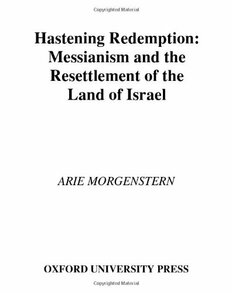
Hastening Redemption: Messianism and the Resettlement of the Land of Israel PDF
299 Pages·2006·1.505 MB·English
Most books are stored in the elastic cloud where traffic is expensive. For this reason, we have a limit on daily download.
Preview Hastening Redemption: Messianism and the Resettlement of the Land of Israel
Description:
Accounts of the history of Zionism usually trace its origins to the late nineteenth century. In this groundbreaking book, Arie Morgenstern argues that its roots go back even further.Morgenstern argues compellingly that the Jewish community in Israel may be traced back to a large-scale wave of immigration during the first half of the nineteenth century. Inspired by an expectation for the coming of the Messiah in the year 1840, thousands of Jews from throughout the Ottoman Empire, North Africa, and Eastern Europe relocated to Jerusalem. Morgenstern describes the messianic awakening in all these lands but focuses primarily on the concept of redemption through messianic activism that prevailed among the disciples of Rabbi Elijah, the Ga'on of Vilna. These immigrants believed that the Messiah's arrival would bring about the redemption of the Jews, but also that, in order for this redemption to come about, they needed to prepare the way for the Messiah by fulfilling the commandment to dwell in the land of Israel. Morgenstern offers a dramatic account of their relocation, their efforts to renew rabbinic ordination, their reestablishment of the Ashkenazi community, and the building of Jerusalem. He also explores the crisis of faith that followed the Messiah's failure to appear as expected, and its effects on the community.Drawing on a wealth of previously untapped sources, Morgenstern sheds important new light on the history of messianic Judaism and on the ideological trends that preceded, and eventually gave birth to, modern political Zionism.
See more
The list of books you might like
Most books are stored in the elastic cloud where traffic is expensive. For this reason, we have a limit on daily download.
